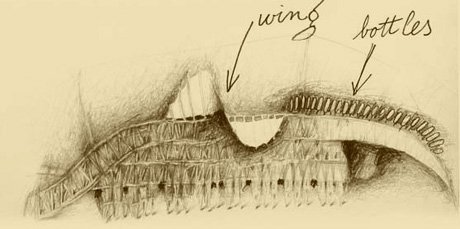The magical Strandbeests:

.jpg)
The kinetic sculptures of Theo Jansen are unlike anything else in the world. They seem to defy category, they are art and machine, but also works of theater on a grand scale. And although they are are not sentient beings, they seem to have a life all their own, and people connect with them.
The Peabody Essex Museum in Salem, MA, is featuring the first major American exhibition of Jansen’s work, before it travels on to Chicago and San Francisco. In a statement on his website, Jansen says he is trying to create “new forms of life” with his sculptures, and seeing them in action makes you think he might actually get there.
Part of the magic of these creatures is that they are self-propelled, and their limbs seem to move like those of animals or insects, and yet their movements are unique to themselves. It is truly like seeing a new species, and it makes us think about what it means to be “alive.” Designed to walk on the beach, some of his creations can detect when they are walking on wet sand, and thus avoid going into the water. There is a kind of artificial intelligence here. How much “intelligence” is necessary before we say that something is alive? Computers have far more artificial intelligence than the strandbeests, and yet because they move around like giant animals, we somehow relate to them more as intelligent beings, we want them to be alive.
From a purely visual standpoint, it amazes me how “natural” these creatures appear, both in their structure and movements. Despite the fact that they are entirely built from human-made materials (PVC pipes, plastic bottles), they seem like creatures that could occur naturally in the world. And yet some of their parts are purely mechanical — no animal uses a wheel and piston to propel their legs.
Here is a short documentary on Jansen and his art:
In the film, Jansen says, “To make my animals, I try to make a new nature, I don’t want to copy the existing nature, but it’s hard to avoid that.” He finds that when he designs the working parts of his creatures, he inevitably winds up with elements like those of living creatures — bones, muscles, legs — because that is the most efficient way to propel an object over uneven ground. He thinks of his creatures as going through their own evolution as he perfects them, much the way nature itself has gone through evolution over a much longer period of time.
Here is a TED Talk by the artist:
https://embed.ted.com/talks/theo_jansen_creates_new_creatures#
And here is a lecture by the artist at the University of Michigan in 2008.
thanks for reading and don't forget to upvote! @sweetness1231